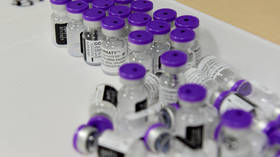‘Safety of vaccine is paramount,’ Pfizer says regarding blood clot case in Australia, amid lingering concerns over side effects

An Australian man was treated for blood clots days after receiving the Pfizer Covid-19 shot. The company says there is no link between the vaccine and clotting, while a probe is underway amid broader concerns over side effects.
“Pfizer considers that the benefit-risk profile of [the vaccine] in preventing COVID-19 remains positive,” the company said in a statement to the media, responding to the Australian case.
With “over 200 million doses having been administered globally” still no evidence has emerged “to conclude that arterial or venous thromboembolic events (blood clots), with or without thrombocytopenia, are a risk associated with the use of our COVID-19 vaccine,” Pfizer claimed.
Earlier this week, it emerged that a 40-year-old police officer from Brisbane developed blood clots a few days after receiving a Pfizer Covid-19 shot. It turned out, however, that the 40-year-old man had a pre-existing condition.
“The sergeant previously underwent surgery on his knee in 2009 and developed deep-vein thrombosis following this procedure,” a police spokesman said.
The officer recovered from the clotting and has already returned to his duties, it was announced. An investigation conducted by the Therapeutic Goods Administration (TGA) into how he developed the blood clots is ongoing. Pfizer said it was looking forward to the TGA’s report.
The links between isolated cases of blood clotting and Covid-19 vaccination campaigns have entered the spotlight, as the EU’s drug regulator, the European Medicines Agency (EMA), found the condition to be a very rare side effect with the AstraZeneca/Oxford vaccine, known now as Vaxzevria, and the Johnson & Johnson vaccine. This prompted wider scrutiny of potentially deadly side effects of vaccines as the world rushes to turn the tide in the pandemic.
For example, Germany’s Paul Ehrlich Institute, which studies and monitors vaccination, noted 407 deaths in its report on suspected vaccine complications and side effects. Of these, 321 people died after receiving the Pfizer vaccine. The data was gathered between December 27, 2020 and April 2, 2021. The patients’ median age was 85. The institute noted, however, that those people who did not die of either Covid-19 or another infection suffered from underlying conditions, such as heart disease or atherosclerosis.
Skeptics are questioning whether the risk of blood clots is as high as the media makes it out to be, and higher than the possible damage from other potential side effects. In February, while analyzing the first month of mRNA vaccine use in the US, the CDC spoke of “rare cases of anaphylaxis after receipt of both vaccines,” which consisted of 4.5 cases per million doses administered.
Meanwhile, the CDC called for the use of the J&J vaccine to be paused after six cases of blood clots were reported, after around 7 million people had received the shot. That adds up to less than one case per million.
Also on rt.com Blood-clotting illness PVT 30x more prevalent in Moderna, Pfizer Covid-19 recipients than AstraZeneca – Oxford researchersLast week, Oxford University, which developed the Vaxzevria vaccine, published a study on different types of blood clotting. Based on data regarding one of the types – portal vein thrombosis (PVT) – it appears that cases were 30 times more common among people who received the Pfizer and Moderna vaccines, than those given the Vaxzervia shot.
The research also included EMA data showing that the incidence rate for splanchnic vein thrombosis for people who received the Vaxzevria vaccine was 1.6 per million. At the same time, according to their analysis, the incidence rate for portal vein thrombosis in people who were administered the Pfizer or Moderna vaccines was 44.9 per million.
However, it should be noted that the researchers were not trying to compare the effects of different vaccines, but used the data to show that people have far greater risk of blood clots after catching the coronavirus, rather that developing them after being vaccinated.
Overall, the researchers’ main aim was to concentrate on the risk of rare blood clotting cases known as cerebral venous thrombosis (CVT), which, they found, is around 100 times greater than normal following Covid-19 infection. They also found that clotting is around eight times more likely to occur after contracting Covid-19 than after receiving the AZ-Oxford Covid-19 vaccine. In the case of Pfizer or Moderna, the risk of CVT from Covid-19 is about 10 times greater.
Also on rt.com Covid-19 vaccine could possibly ‘trigger’ herpes infection in rare cases – studyConcerns about mRNA vaccines were again raised in January after correspondence between the EMA and vaccine-makers that sought its approval was dumped online. Peer-reviewed medical journal, the BMJ, which analyzed the leaked documents, reported that the EMA was worried about “truncated and modified mRNA species” in some of the Pfizer jabs. Intact mRNA molecules are crucial for vaccines of this type to function.
The European regulator ultimately approved the emergency use of the Pfizer shot and said that the documents were “manipulated” by hackers prior to the publication in order to undermine trust in vaccines. The regulator told the French newspaper Le Monde that Pfizer had ultimately “resolved” all of the issues necessary for approval.
To weigh in on the issue of safety of mRNA vaccines, RT spoke to Dmitry Kulish, a professor and a biotechnology expert at Skoltech, Russia’s Skolkovo Institute of Science and Technology. He told RT that the existing research shows how the so-called toll-like receptors – a protein class that detects viruses – trigger inflammatory mechanisms when encountering foreign mRNA. He said inflammation can then lead to atherosclerosis, which in turn prompts the formation of blood clots in arteries.
“It was proven that one of the systemic effects of the inflammatory cascade are small cracks in blood vessels. The main consequence of these cracks are blood clots,” he said.
A great volume of data demonstrates that toll-like receptors generally have a lot calmer reaction to DNA rather than to RNA. It’s important to understand this.
At the same time, Kulish cautioned against jumping to conclusions. “Until this year, no one has injected that much RNA into the cells of a living human,” he said.
He added that a pharmaceutical giant like Pfizer would have likely addressed all of the EMA’s major concerns before the regulator gave its vaccine the green light. “Purification of mRNA-type vaccines is simple and inexpensive,” he said.
“Nevertheless, I am prepared to believe that professionals working in international pharmaceutical companies could have tried to save money on purification, and because of that something went wrong,” he said. “But that they had made some kind of a dramatic error in terms of the scale – in that I don’t believe.”
While there are some concerns, the researcher maintained that “any vaccine,” be it Sputnik, Pfizer or any other, “protects humans from all health problems a hundred times better [than none at all].”
Think your friends would be interested? Share this story!














